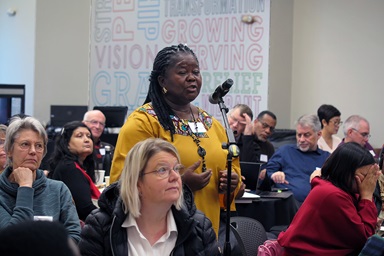The United Methodist Judicial Council issued rulings in the two cases on its docket as the church’s highest court held its spring meeting at the site of the 2004 General Conference.
The council will continue to meet during General Conference and respond to requests from the legislative assembly as they arise. General Conference adjourns May 7.
In one April 29 decision, the council ruled that local pastors in the United Methodist Church do not lose the right to the supervisory process and a possible trial if their appointment is terminated, provided that they had received a written and signed complaint from their bishop or district superintendent. The request for a declaratory decision came from the California-Pacific Annual (regional) Conference.
In the second case, the council ruled that the Louisiana Annual Conference’s structure and rules are still not in compliance with the denomination’s Book of Discipline and previous Judicial Council decisions. This is the fourth time the council has ruled the Louisiana Conference’s revised structure null and void.
In the California-Pacific case, a local pastor received a letter of termination from his district superintendent, citing chargeable offenses under Paragraph 2702.1 of the Book of Discipline. A clergy advocate of the terminated pastor regarded the letter of termination as a formal complaint, and asked the annual conference to request a decision from the Judicial Council as to whether the termination of an appointment ends a local pastor’s right to due process.
The council ruled that once a complaint is filed, the right to fair process is not affected by any change in a pastor’s appointment status. However, the local pastor must be informed of the process for filing the complaint and its purpose.
Four of the council’s nine members signed a dissenting opinion, stating that the ruling dilutes the power of a bishop to discontinue a local pastor’s appointment. The dissenters argued that termination of an appointment ends a local pastor’s right to due process.
“The discontinuance of the appointment of a local pastor severs the conference ministerial relationship and the attendant fair process rights because that individual is no longer a local pastor,” they wrote. “The Discipline, in Paragraph 346.1, does not impose upon the bishop any criteria, constraint or guideline for the discontinuance of a local pastor’s appointment. If a bishop’s authority of appointment or discontinuance of a local pastor is to be diminished or curtailed, it must be accomplished by the General Conference and not by the Judicial Council.”
The dissenting opinion was signed by Sally Curtis AsKew, Sally Brown Geis, the Rev. Larry D. Pickens and Mary A. Daffin. Those in the majority were the Rev. John G. Corry, the Rev. C. Rex Bevins, Rodolfo Beltran, the Rev. Keith Boyette and James Holsinger.
In the other case, the Louisiana Conference had approved revisions and amendments to its conference structure and rules in 2002, after the Judicial Council had found that deficiencies continued to exist. The court had instructed the conference to advise and resubmit its structure and rules.
However, in reviewing the 2002 revisions, the council found that many of the same deficiencies still exist. The ruling listed a number of examples where Louisiana’s rules “fall short” of the Discipline and also stated that the list of examples was “not exhaustive.” The conference was directed to review its entire plan for compliance.
The decision reads, in part: “When an annual conference seeks to establish its own structure, the structure must be in accordance with the requirements of the Discipline and the decisions of the Judicial Council in order to be constitutional.”
The council remanded the structure and rules back to the Louisiana Conference and directed that any revision or amendments be submitted to the Judicial Council by July 15 in the year which they are approved.
The council will continue to be available during General Conference to make additional decisions. In a motion that was approved on the floor of General Conference on April 27, the Judicial Council was requested to rule whether or not Paragraph 304.3 of the Book of Discipline constitutes a declaration by the United Methodist Church that “the practice of homosexuality is incompatible with Christian teachings,” and if so, does Paragraph 2702.1(b) “incorporate that declaration into church law by reference?” The council has not yet ruled on that question.
*Caldwell is a correspondent for United Methodist News Service.
News media contact: (412) 325-6080 during General Conference, April 27-May 7.
After May 10: (615) 742-5470.
Like what you're reading? Support the ministry of UM News! Your support ensures the latest denominational news, dynamic stories and informative articles will continue to connect our global community. Make a tax-deductible donation at ResourceUMC.org/GiveUMCom.



